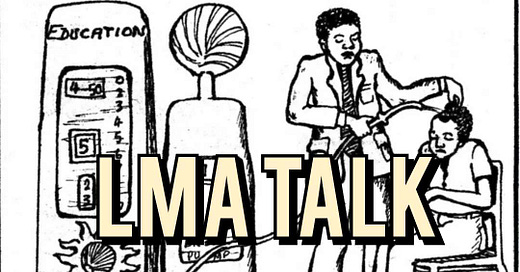Note: This is an unlocked LMA module. If you want access to the rest of Liberation Martial Arts, upgrade your account. We send out learning modules almost daily. If you're no longer getting LMA updates, your payment information may no longer be up to date. Click on the table of contents above to see if you have access to LMA.
Sam here again with another edition of LMA Talk, where I discuss my thoughts about building the Liberation Martial Arts curriculum. Since I have an online presence and since most people I interact with are not in Liberation Martial Arts, they might just reduce me and the project down to "anti-fascist martial arts" or leftist martial arts. So, sometimes, I get asked what the best style for self-defense is. I was just asked this recently.
Here's my take, and it's a take you won't see ever. But rather than style (as in, this art is best for self-defense), it's about the number of rounds you've had dynamic sparring. Dynamic as in unpredictable and unscripted. Whether it's sport or, say, some situation you encounter during a protest or existing as an LGBTQ person, what matters most are your senses and externally focused decision-making. Being aware of the world around you and retrieving a lot of information about it while ignoring noise. How developed are your senses, and how quickly and well can you perceive your environment and make decisions accordingly?
Perception and adaptability are not things you can learn consciously or intellectualize. They live in the body, and that takes lots of rounds.
"Style" actually makes self-defense seem less effortful. You just pick a style, and now you're bulletproof. What matters is the research you do beforehand or what door you step through like a magic pill rather than what you do once you step through that door. There's absolutely no consideration of the number of hours.
If you're listening to this, you've probably asked or seen someone ask about the best style for self-defense. That's a whole genre of YouTube. How often have you heard someone ask how many hours it takes to get good enough to actually defend yourself? I'd bet never. You've never asked it or seen anyone else ask it when that's the most important question.
But it's not a question at all if you're still operating under the paradigm of a magic pill, and that's even how people who train operate. They'll tell you to train their style and won't think twice about the hours needed to make that meaningful. They themselves probably get frustrated with their ability despite not putting in the requisite hours. Or maybe they barely trained and think they're already proficient, so hours don't matter. But if you're in a pedagogy where the number of hours doesn't matter, well then, you've got a magical style, I suppose.
However, if the primary question is about the number of hours, well, that's much harder to attain than merely picking a style. In fact, hours would basically determine your style and gym because you'd have to find a place you could stick with for countless hours. (This also includes material conditions, such as distance, cost, and class schedule.)
Self-defense is an infinite matrix. It's a promise no one can keep. Trying to prepare for each scenario one by one is futile. It's like preemptively determining where to block, which just means training to do the wrong thing perfectly.
Also, self-defense scenarios are often playing into the most racist stereotypes. The training itself is scripted and deterministic, where you rehearse a solution provided by the instructor for a problem also provided by the instructor when real life is not only infinite in situations, but each situation is dynamic.
You have martial artists who make up self-defense storylines with predetermined outcomes, who then choreograph and script answers to those storylines, who then rehearse those scripts and outcomes, who then make fun of pro wrestling because it's predetermined stories with rehearsed movements.
At least pro wrestlers have an eventual payoff for all their rehearsals. Many martial artists are infinitely rehearsing and then get confused when people drop off because it's not that much fun to just rehearse weird shit their instructors come up with.
Most pro wrestlers also don't need to rehearse; they can improvise in the ring, which is a lot more than I can say about many martial artists and self-defense people.
What's even weirder is these same martial artists always say, "You are what you practice." Then, lots of them are shitty pro wrestlers who've bought into their work. At least pro wrestlers know their storylines are made up.
The thing about real-world violence, it's not only an infinite matrix but it'll also never happen the same way twice. That means the training needs to foster live problem-solving, develop senses, and attune practitioners to the moment and environment.
What we get instead is the instructor feeding you answers to problems they've made up. So, of course, they always have the right answer; they made up the question. Then, you never develop problem-solving; you just memorize the solutions provided to you by the authority for very, very specific scenarios. It's like learning to shoot a three-pointer only for solar eclipses. But you've only been taught the script, which you have to regurgitate. You've never actually hit a three-pointer in a solar eclipse.
Why not learn to shoot three-pointers but also passes, two-pointers, free throws, and everything else in every situation? The adaptable survive, not the inflexible and rigid, who rely on memory recall rather than problem-solving.
Recalling past information accurately is a luxury. Recall also makes you rigid and stiff because you're trying to remember mechanical movements step by step. But intense situations ruin memory. Doing things step by step makes you hesitant and slow. Having to recall at all makes you second guess.
Furthermore, who's to say what you were taught is even the right call? What if the window for remembering has passed, and you need to improvise? Have you been trained to think on your feet and adapt?
Despite the word not sounding grave enough to encompass all of infinity, the term for developing all this is "play." Developing proficiency takes a lot of hours. To commit that much time, it better be fun and playful. Your ability to protect yourself or those around you is about how proficient you are at adapting to the material conditions—the conditions of the game.
The anti-radical paradigms even radicals operate under when it comes to martial arts made me think about Indigenous and Black theories of self-determination, how that applies to the body, and how direct instruction is counter to self-determination. People must be allowed the autonomy and space to determine their own movements.
I don't mean space metaphorically, as in "holding space," though that's a part of it, too. But what I mean by space is physical space. You can't have self-determination without physical space. There's a lot to unpack here. It's not just instructors backing off and giving people physical space to move or students giving each other space.
It also means finding training spaces where people can self-determine their movements and what they get out of it. Can that be done in crowded public spaces? Can you even have an instructor in a space for self-determination? These are just some of the things you must consider when taking physical space and self-determination seriously.
Liberation Martial Arts is not just a lefty version of the oppressor's martial arts pedagogy. It's not simply, "We'll replicate all the same teachings and practices but use them to fight Nazis!"
Self-determination means our practitioners individually decide how they will use their embodied knowledge. No one should prescribe that for them.
We're not lefty self-defense. We're not anti-fascist martial arts. We're Liberation Martial Arts. What we offer is self-regulation, awareness, and adaptability. You can apply our pedagogy to all that you do, including just breathing and existing.
We have to shift the paradigm from being just a conversation about what is being taught to having the conversation first be about how it's being taught and why it's being taught. For LMA, our how is exploration and wayfinding. Our why is fun and living a life worth living. Our what is mixed martial arts because it affords the most variability and flexibility.
To access the Liberation Martial Arts curriculum and contribute to the sustainability of this project as my family and I navigate some recent health and financial challenges, consider upgrading your membership. If you've been putting it off, now would be a great time to sign up. Find other ways to support us here. – Sam
✊✊✊
(I write daily about martial arts and other topics from a liberatory perspective. If you like my work, upgrade your subscription. You can also support me on Patreon or make a one-time donation on Ko-fi. Find Southpaw at its website. Get the swag on Spring. Also check out Liberation Martial Arts Online.)














Share this post